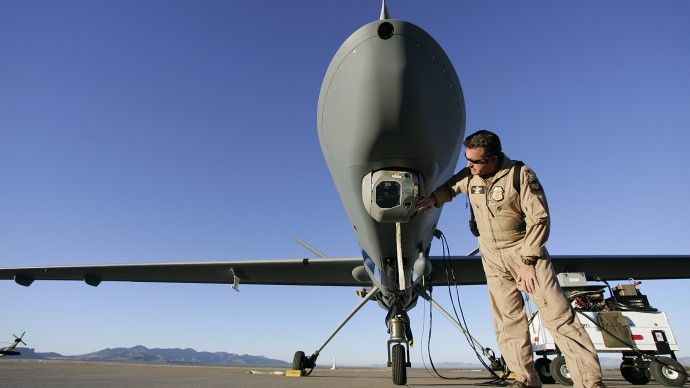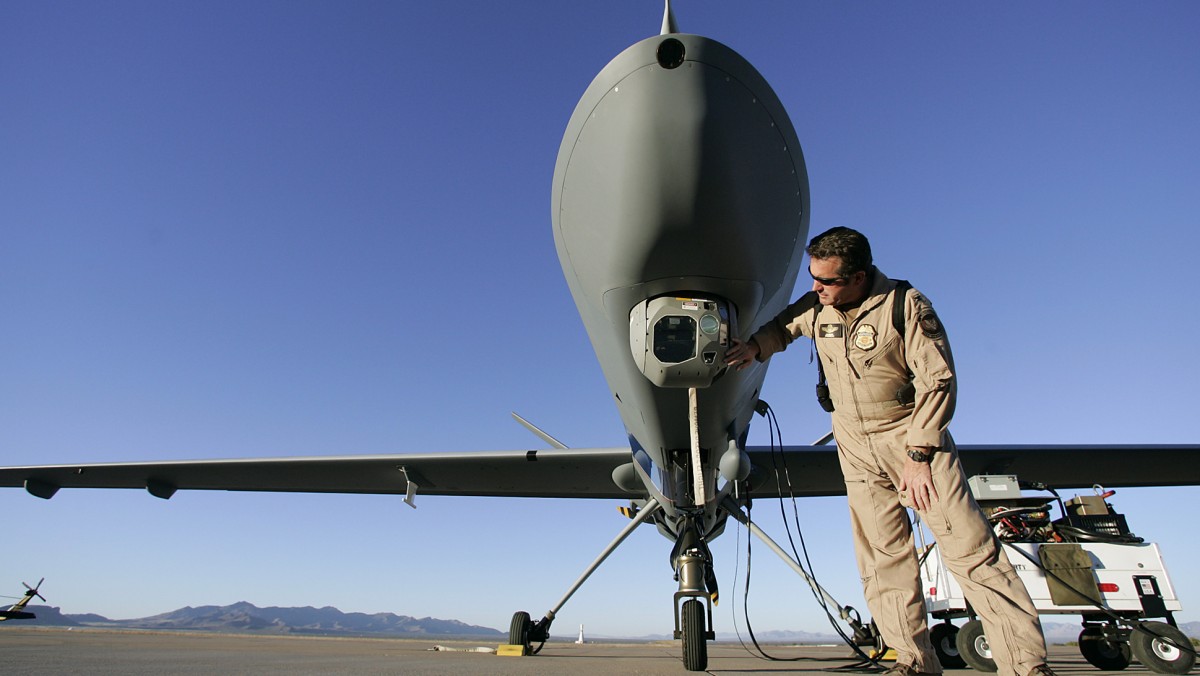
(MintPress) – Since unmanned drones entered the domestic and national security arsenal in the mid-2000s, speculation of their intended domestic use has always taken precedent. Internationally, drones have predominantly been used as an additional military weapon to promote strikes on militants in countries such as Pakistan and Afghanistan. Stateside, details of drone usage have been few and far between. But a recent Freedom of Information Act request from the Electronic Frontier Foundation (EFF) found that domestic surveillance is the overwhelming motivation behind their use in the United States.
In a swath of documents, drone technologies and capabilities are outlined from public municipalities and private corporations. The information shows which entities are approved for Special Airworthiness Certificates (SAC) from the Federal Aviation Administration (FAA) for “authorization to operate an aircraft in the U.S. airspace.” Private entities that have been granted SACs include private defense contractors Raytheon, Blackwater Airships, Defense Technologies and Honeywell International. While it’s unclear how many of those drones are to remain stateside, a majority of them are used for international purposes.
But the information request revealed a multitude of instances where drones used by city police departments were fitted with cameras, suggesting domestic law enforcement agencies are hoping to utilize the technology as a means of surveillance. In one instance, the documents showed plans for drone usage from the Seattle Police Department that equipped the unmanned aircraft with wireless video cameras and still cameras. The Seattle PD has also purchased thermal infrared cameras and advanced video links.
Other large operators of drones with the same technology found on those in Seattle include the Texas Department of Public Safety, the Miami-Dade Police Department and the North Little Rock Police Department. The EFF says the motivation for the use of domestic drones is much clearer, although relaxed oversight of flight-by-flight operations remains essentially non-existent.
“Drone flights in the U.S. have been all about developing and testing surveillance technology,” the EFF wrote.
Lax regulations cause concern
Oversight of domestic drone usage has become a contentious issue in light of their expanded use. As the FAA continues to sign off on Certificates of Authorization (COA) for drone usage, political leaders, such as Rand Paul, argue that there should be legislation written to dictate their usage before drone programs are expanded. In June, Paul introduced a bill, the Preserving Freedom from Unwarranted Surveillance Act of 2012, which would require drone operators to obtain a search warrant before each flight that specifically states what the purpose of the flight is.
Currently, once a COA is authorized for a local law enforcement agency, the oversight on the usage of the drones is relaxed. COA holders typically report flying times and dates to the FAA in monthly reports, but no other branch of government. That simplified regulation has Paul worried that police departments could abuse the drones to violate privacy laws.
“Like other tools used to collect information in law enforcement, in order to use drones a warrant needs to be issued,” Paul wrote in a June statement. “Americans going about their everyday lives should not be treated like criminals or terrorists and have their rights infringed upon by military tactics.”
Paul echoed the fears of many who deal with civil rights issues, such as the American Civil Liberties Union (ACLU). He noted that widespread drone flights could usher in a new level of surveillance tactics in the U.S.
“I don’t want drones roaming across, crisscrossing our cities and our country snooping on Americans,” Paul said. “And that’s the surveillance state that I’m very concerned about. And that’s what our bill would stop.”
The ACLU has come out against domestic drone usage since its infancy, particularly against arming domestic drones in a similar fashion to their international counterparts. But the civil rights organization still argues that invasion of privacy and surveillance remains the most pressing issues of drones in American skies.
“This type of routine aerial surveillance in American life would profoundly change the character of public life in the United States,” the ACLU says. “Rules must be put in place to ensure that we can enjoy the benefits of this new technology without bringing us closer to a ‘surveillance society’ in which our every move is monitored, tracked, recorded and scrutinized by the authorities.”
International drone usage
What may be used for snooping in the U.S. has devolved into a much scarier situation, particularly in Pakistan, where drones have been responsible for more than 330 separate strikes and the deaths of upward of 3,250 people – including around 850 civilians. Drone strikes overseas are also becoming more common in Yemen and Somalia.
But Obama claims the drones are being unfairly vilified and that the findings of tallied civilian deaths are unfounded. The president said the strikes were not as widespread as the media reported and that they were precisely targeted and carried out.
“Drones have not caused a huge number of civilian casualties’, Obama has said. “This is a targeted, focused effort at people who are on a list of active terrorists trying to go in and harm Americans.”
A study from the Bureau of Investigative Journalism (BIJ) would suggest otherwise, however. Peter Singer of the Brookings Institute suggests that because there has never been a serious conversation within Congress about the role of drones internationally and especially domestically, that the scale of their operations is debated in government. Singer estimates that the U.S. has 7,000 drones operating overseas with another 12,000 on the ground ready to go.
But while governing the drone program maybe become a priority for the U.S., U.N. rapporteur Christof Heyns, a South African law professor, said there needs to be a legal framework set up on an international scale to dictate what is allowed when it comes to countries using drones on one another.
“Our concern is how far does it go – will the whole world be a theatre of war?” Heyns asked BIJ. “Drones in principle allow collateral damage to be minimized but because they can be used without danger to a country’s own troops they tend to be used more widely. One doesn’t want to use the term ticking bomb but it’s extremely seductive.”


